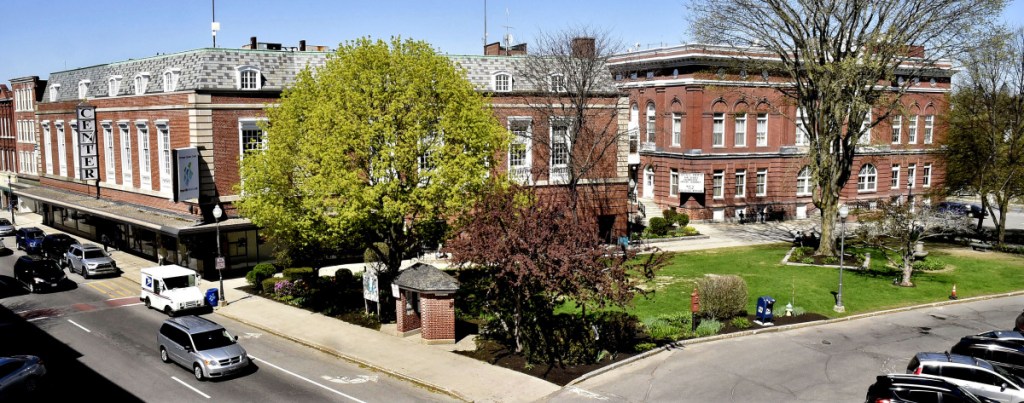Come June 16, it will have been 100 years since Master Sgt. Arthur Castonguay, of Waterville, was wounded in action in the Château Thierry battle in Civray, France.
It was World War I, and two days later, on June 18, 1918, Castonguay died, the first person from Waterville to die in the war.
The name “Castonguay” is familiar to many of us who live in Waterville, as Castonguay Square is a popular and beautiful park downtown — but is it common knowledge that it was named in honor of Arthur Castonguay?
In the square, which is in the shadow of City Hall, is a large boulder with a plaque erected by residents in memory of Castonguay. On Nov. 11, 1921, three years after he died, the American Legion dedicated the plaque.
It was a windy morning that November when thousands of people lined Main Street, according to a piece I found in the Morning Sentinel archive, written by Clayton LaVerdiere, longtime Morning Sentinel reporter, editor and columnist.
The air was festive, a band performed and the park, then known as Park Square, was re-named Castonguay Square in honor of the deceased war hero.
A fire horn at Central Fire Station blasted a loud siren, the music stopped and people prayed. Later, they watched a parade.
As we move through our lives, it’s easy to take names for granted. Castonguay Square for many is simply a place to stop and rest, eat lunch at a picnic table, enjoy some shade on a summer day.
It is a central location we cite when describing to out-of-towners where a certain shop or restaurant is. It is in the heart of the city, between Main and Front streets, near the Waterville Opera House, and is used frequently for Maine International Film Festival, Colby College and Waterville Creates! events.
Thirty-two years ago, in 1986, a local volunteer group charged with helping to beautify downtown Waterville unveiled a plan to enhance Castonguay Square by redesigning it to maintain a turn-of-the-century look. The Great Revitalization of Waterville committee, also known as GROW, proposed removing parking spaces on the south side of City Hall, closing a road there that ran from Front to Main Street, just as Common Street does now, and building a platform at the entrance to City Hall that would jut out into the square to be used for speeches and other community events. The $100,000 project, supported by former mayor Thomas J. Nale, included extending the park’s grassy area, installing cobblestones, sidewalks and lights and planting more grass and shrubs.
Residents and city officials celebrated the park renovation July 13, 1986. The New England Music Camp played music and the cast of the Waterville Summer Music Theatre performed numbers from “A Chorus Line,” which was showing at the Opera House.
Time marches on.
This month, Waterville Creates!, an arts and cultural organization based in The Center, next to City Hall, announced it had been awarded a $75,000 grant from the National Endowment for the Arts to work with Colby, the city and public to plan for redesigning Castonguay Square.
Coincidentally, the Sentinel received an email May 10 from Kenneth Castonguay, who said he is a nephew of Arthur Castonguay.
“His brother, my Dad, was wounded in the same battle and awarded the Purple Heart,” wrote Castonguay, of Redondo Beach, California. “He volunteered again in World War II, enlisting at age 44, and served in the Aleutian Islands. His son, my brother, now 93, was wounded in WWII in the Battle of the Bulge, awarded the Purple Heart and the Bronze Star for valor under fire. Like our Dad, he volunteered again at the outbreak of the Korean War in 1951. While I was fortunate in never experiencing combat, I served in the 3rd Infantry Division during the Korean War. Ours was one of the many families in the Waterville area who contributed more than their share in three wars in the defense of our country.”
Kenneth Castonguay wrote further that while he has lived in California since 1957, he still reads the Sentinel online every day and has been following with great interest downtown revitalization efforts in Waterville, “one of the greatest little cities in the country.”
On Thursday, I strolled through Castonguay Square, where Dave Higgins, maintenance custodian for City Hall, was watering flowers and plants and identifying some shrubs that had been killed during the winter and needed to be replaced.
“The flowers will be coming next week,” he said, referring to the blooms that adorn the railing at City Hall every summer. “That really helps a lot and beautifies things.”
I asked Higgins, who carefully tends the flowers all summer, what he would hope to see as part of the redesign of Castonguay Square. He said simply that he hopes no green space is lost.
As for me, I’m pretty confident that whatever is done will produce an even more beautiful and user-friendly square.
My only recommendation — or urging, to be more precise — is that it not be renamed.
“Castonguay” represents a legacy we should preserve forever.
Amy Calder has been a Morning Sentinel reporter 30 years. Her column appears here Mondays. She may be reached at acalder@centralmaine.com. For previous Reporting Aside columns, go to centralmaine.com.
Send questions/comments to the editors.


